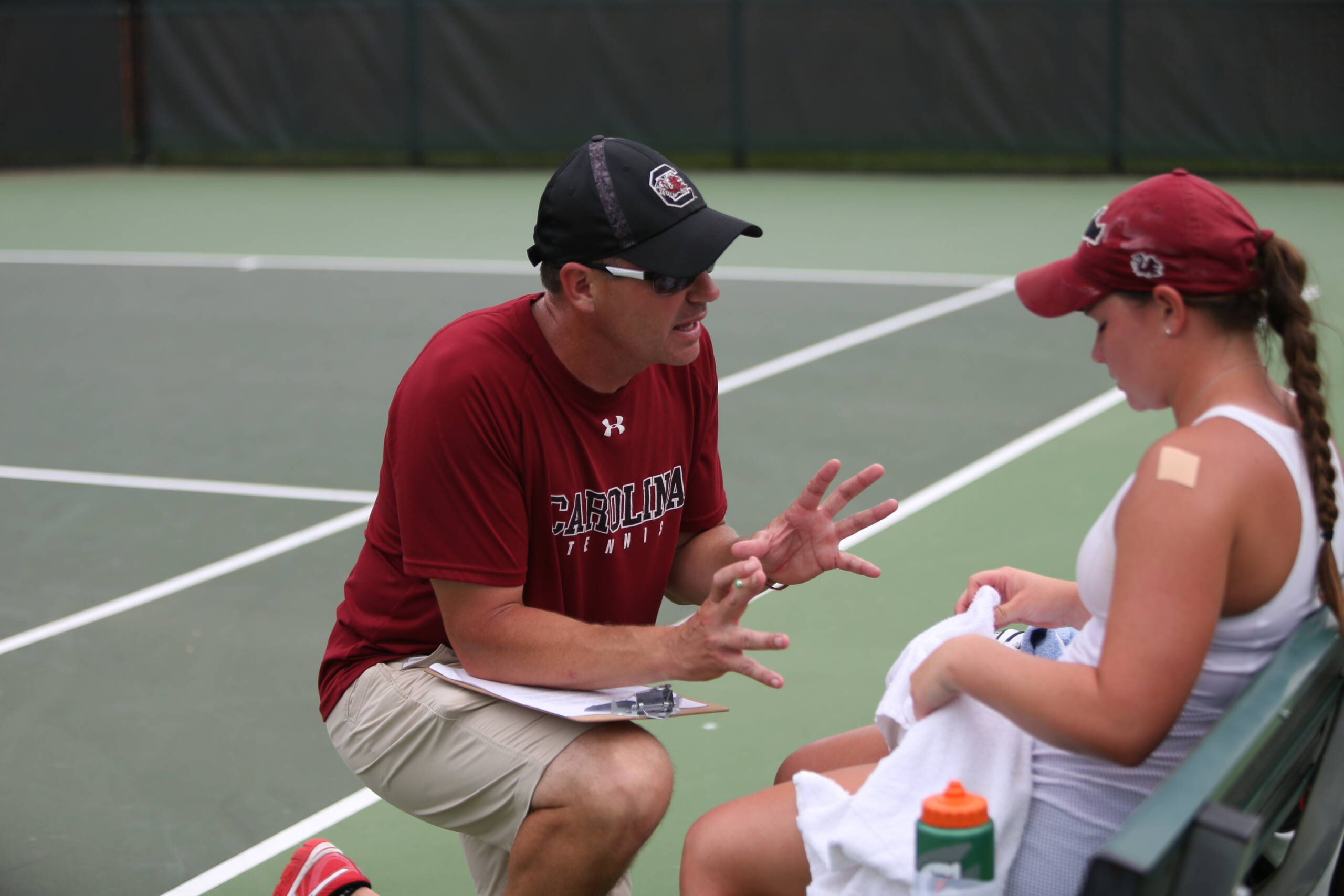
South Carolina Coach Influenced and Mentored by Billie Jean King
June 30, 2015

South Carolina’s Kevin Epley has coached many outstanding young tennis players in his 11 years as a college head coach, and he has also had the opportunity to work with some of the best professional women’s tennis players. One of Epley’s greatest influences in his career is women’s tennis hall of famer Billie Jean King.
“She has certainly been my mentor,” Epley said. “I probably wouldn’t even be in women’s college tennis if it wasn’t for Billie. It would be hard for me to say that anyone has influenced me more than her.”
Epley recently finished his third year at South Carolina and has taken his teams to the NCAA Tournament in each of his eleven years as a college head coach. Earlier in his career, Epley worked with King as an assistant for the U.S. Federation Cup team from 1997 to 2002 and also as an assistant for the U.S. Olympic team for the 2000 Sydney games.
“The great thing about Kevin is that he always wanted to keep on learning,” King said. “Any place he has been, he has made a huge impact. He was always trying to figure out a way to be a better coach, which I loved.”
Epley met King in the late 1990s through a colleague from the Nick Bolliettieri Tennis Academy in Florida. King was coaching the United States’ Federation Cup Team and was looking for some assistance. The Fed Cup team competes against other countries in an international tennis event. After speaking on the phone, King was willing to give Epley a chance.
“I was a young guy in my mid-20s, so this was a pretty neat experience,” Epley said. “I remember being on the court with Billie, and the passion she had just blew me away. She could spend the entire day out there and wouldn’t miss a beat.”
King said her passion was something she learned from her parents, but she was not a dictator. In fact, she asked all of her players and coaches to speak up when they had an opinion, and all she asked is that everyone be on time.
“That was my one and only rule,” King said. “Most people were ten minutes early around me. Kevin was always very enthusiastic about everything, no matter how small it was. When the players see that, and that we’re getting along like a family, they notice it. It helped create a really good working atmosphere for them. I’m a perfectionist, but I like to have fun too, and Kevin was like that as well.”
The Fed Cup team included Lindsay Davenport, Monica Seles, Mary Joe Fernandez, and Lisa Raymond. It would later include young stars Venus and Serena Williams. Epley’s main role as an assistant to King was to hit with the players and to consult with her about the team. For Epley, and many other people, King is a pioneer who blazed a path for more than just women’s tennis.
“This is someone who created the infrastructure for the WTA tour,” Epley said. “When you think about women’s sports, it was non-existent for a long time. Heck, Title IX is only 43 years old. College sports back then, there were only 1-in-27 girls playing sports, now 40% are. Women’s college sports have grown so much. Women’s sports themselves are big on the world stage now. There are professional women’s leagues for many sports these days. Tennis is one of the very few sports where the women’s side has nearly the same profile as the men. It’s just as big. There was nothing like that or any revenue streams and financial backing before Billie came along. She is responsible for a lot of that.”
I always tell people, especially young people, the more you know about history, the more you know about yourself.
Billie Jean King
Epley’s first interaction with King and the Fed Cup team at a tournament in Kiawah Island, South Carolina, made him realize that she was more than just a great tennis player.
“She literally navigated the entire place and went to every single person that was associated with it, even the people that were building the stands, and just thanked them,” Epley recalled. “She thanked all the ball-kids. She really understands that all this great stuff that is happening didn’t just show up – there are a lot of people working hard to make it happen. That was an amazing thing to see. She is just very thankful and very humble. She is so motivated by the heart and wanting to give back. She is just all love.”
On the courts, Epley enjoyed the opportunity to work with some of the great professionals of the time, and admits that he was a little bit intimidated early on.
“I was so nervous when I first started hitting with them,” Epley said. “They’re so good. I wasn’t really playing well, but Billie was just as positive as she could be with me, particularly off the court. I was wondering if she was going to want me back for the next tournament, but she said `you’re family, Kevin.’ That’s how she is.”
That next tournament took the team to Italy, where King spent some time off the court to talk to the team and offer a history lesson from her point of view.
“We’d be on the court all day long,” Epley said. “Billie is jumping around the entire time. She is so passionate. At night, we go out and eat and come back and Billie would tell us stories about Title IX, the tour, and what it was like for her with all the battles she went through. Of course there was the battle of the sexes in 1973. Just hearing these stories come out of her mouth is an experience I will never forget.”
“I always tell people, especially young people, the more you know about history, the more you know about yourself,” King said. “I keep telling them that they can shape the future, but you have to know your history. I know it helped me a lot in how I approached the future. You learn a lot when you read about what others went through and how they went from `plan A’ to `plan B’ and so on.”
It was in those late night conversations that King explained how women have progressed and the opportunities that were now open. Epley took those lessons to heart as well.
“She knew at a very young age that she wanted more diversity and equality in tennis,” Epley said. “In the 1970s in particular, she was the major driver to get equal prize money for women. She refused to play some major events, and was on the forefront of most of the critical movements that were moving women forward. Billie lived through that time in American history and seeing how the roles of women have changed so drastically since then really got me thinking about the opportunities they now have. Now, I’m living it. All of these incredible experiences I have had are all attributed to her.”
King said she made a commitment to herself when she was 12 years old that she would spend her life working for equal rights and opportunities for boys and girls.
“It’s what I do off the court that has always mattered more to me,” King said. “Tennis allowed me to have a great platform. It gave me an opportunity to be heard. I knew, as a girl, it would be harder. I had to be No. 1 before anyone would listen to me. Title IX made a huge difference, not just for sports.”
Epley credits King for teaching him how to coach women.
“She taught me some of the nuances that I had to know and walked me through these things,” Epley said. “She taught me that the same things that make men great as a professional are the same things that make professional women great. There’s no difference. They are focused. Their preparation is the same. She also taught me to seek out individuals who have potential and help them nurture it.”
He witnessed just that when King dealt with the young Williams sisters. King was extremely excited to have them on the team, but didn’t give them any special treatment. Epley said King did recognize that the then lesser known Serena Williams had the potential to be one of the best.
“She dove into Serena, and Billie’s message was that she needed to step out from her sister’s shadow and create some separation,” Epley said. “We saw Serena during an eight day period just get better and better and on the final day, she just destroyed her opponent. We never saw someone get so much better so fast, and so much of that is what Billie had done in terms of building her up. Honestly, I think that was the start of Serena’s career. She took off from there.”
While he has proven to be successful on his own, Epley’s commitment to college tennis was heavily influenced by King’s philosophies.
“Billie is very much into team sports, much more so than individual sports,” Epley said. “Of course, she loves the challenges that a tennis player must go through on their own on the court, but her true passion is playing tennis on a team–that winning together means so much more than winning by oneself. During the Fed Cup/Olympic years, it was a challenge for many of the team members to relinquish their coaches and the individual mindset that they players were accustomed too for the rest of the year.”
As he focuses his career on the college game, Epley wants to make sure his student-athletes know it wasn’t so long ago when such opportunities weren’t available for women.
“It’s funny how things change,” Epley said. “Some players now take scholarships for granted. She was at the forefront of everything that sports has now for women on a professional level and for collegiate players. They owe a lot of what they got to her. Her influence is still out there. We live them every day.”
Billie Jean King image courtesy of Andrew Coppa Photography












